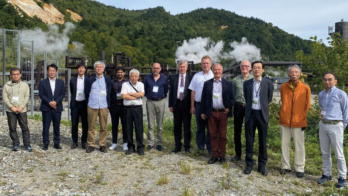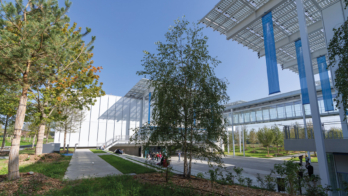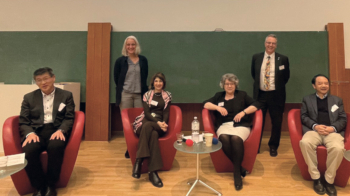
CERN hosted a workshop on high-energy theory and gender on 26–28 September. It was the first activity of the “Gen-HET” working group, whose goals are to improve the presence and visibility of women in the field of high-energy theory and increase awareness of gender issues.
Most of the talks in the workshop were on physics. Invited talks spanned the whole of high-energy theory, providing an opportunity for participants to learn about new results in neighbouring research areas at this interesting time for the field. Topics ranged from the anti-de-Sitter/conformal field theory (AdS/CFT) correspondence and inflationary cosmology to heavy-ion, neutrino and beyond-Standard Model physics.
Agnese Bissi (Uppsala University, Sweden) began the physics programme by reviewing the now-two-decades-old AdS/CFT correspondence, and discussing the use of conformal bootstrap methods in holography. Korinna Zapp (LIP, Lisbon, Portugal and CERN) then put three recent discoveries in heavy-ion physics into perspective: the hydrodynamic behaviour of soft particles; jet quenching; and surprising similarities between soft particle production in high-multiplicity proton–proton and heavy-ion collisions.
JiJi Fan (Brown University, USA) delved into the myriad world of beyond-the Standard Model phenomenology, discussing the possibility that the Higgs is “meso-tuned” but that there are no other light scalars. Elvira Gamiz (University of Granada, Spain) reviewed key features of lattice simulations for flavour physics and mentioned significant tensions with some experimental results that are as high as 3σ in certain B-decay channels. The theory colloquium, by Ana Achucarro (University of Leiden, Holland, and UPV-EHU Bilbao, Spain), was devoted to the topic of inflation, which still presents a major challenge to theorists.
The importance of parton distribution functions in an era of high-precision physics was the focus of a talk by Maria Ubiali (University of Cambridge, UK), who explained the state-of-the-art methods used. Reviewing key topics in cosmology and particle physics, Laura Covi (Georg-August-University Göttingen, Germany) then described how models with heavy R-parity violating supersymmetry lead to scenarios for baryogenesis and gravitino dark matter.
In neutrino physics, Silvia Pascoli (Durham University, UK) gave an authoritative overview of the experimental and theoretical status, while Tracy Slatyer (MIT, USA) did the same for dark matter, emphasising the necessity of search strategies that test many possible dark-matter models.
Closing the event, Alejandra Castro (University of Amsterdam, the Netherlands) talked about black-hole entropy and its fascinating connections with holography and number theory. The final physics talk, by Eleni Vyronidou (CERN), covered Standard Model effective field theory (SMEFT), which provides a pathway to new physics above the direct energy-reach of colliders.
The rest of the workshop centred on talks and discussion sessions about gender issues. The full spectrum of issues was addressed, a few examples of which are given here.
Julie Moote from University College London, UK, delivered a talk on behalf of the Aspires project in the UK, which is exploring how social identities and inequalities affect students continuing in science, while Marieke van den Brink from Radboud University Nijmegen, the Netherlands, described systematic biases that were uncovered by her group’s studies of around 1000 professorial appointments in the Netherlands. Meytal Eran-Jona from the Weizmann Institute of Science, Israel, reviewed studies about unconscious bias and its implications for women in academia, and described avenues to promote gender equality in the field.
The last day of the meeting focused on actions that physicists can take to improve diversity in their own departments. For example, Jess Wade from Imperial College London, UK, discussed UK initiatives such as the Institute of Physics Juno and Athena SWAN awards, and Yossi Nir from the Weizmann Institute gave an inspiring account of his work on increasing female participation in physics in Israel. One presentation drawing on bibliometric data in high-energy theory attracted much attention beyond the workshop, as has been widely reported elsewhere.
This first workshop on high-energy theory and gender combined great physics, mentoring and networking. The additional focus on gender gave participants the opportunity to learn about the sociological causes of gender imbalance and how universities and research institutes are addressing them.
We are very grateful to many colleagues for their support in putting together this meeting, which received help from the CERN diversity office and financial support from the CERN theory department, the Mainz “cluster of excellence” PRISMA, Italy’s National Institute for Nuclear Physics (INFN), the University of Milano-Bicocca, the ERC and the COST network.
Similar activities are planned in the future, including discussions on other scientific communities and minority groups.





